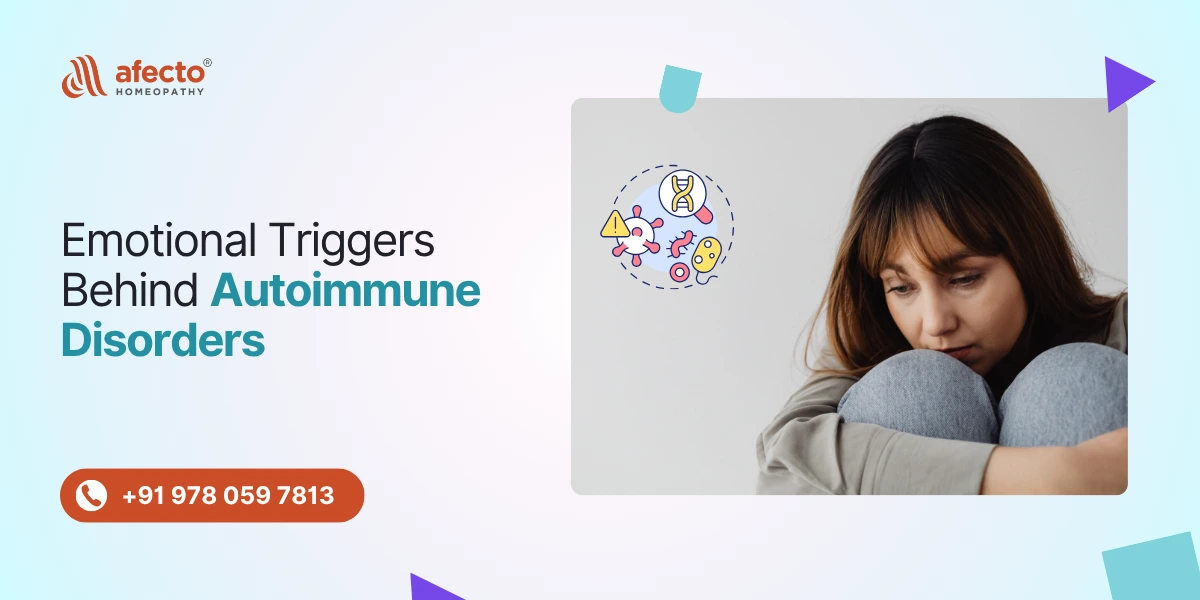An autoimmune disease occurs when the body’s immune system — normally your shield against infections — mistakenly attacks its own healthy tissues. This results in chronic inflammation, tissue damage, and widespread symptoms like fatigue, pain, and swelling.
There are over 80 types of autoimmune diseases, including:
- Rheumatoid arthritis – affecting joints
- Lupus (SLE) – involving skin and internal organs
- Hashimoto’s thyroiditis – damaging the thyroid gland
- Psoriasis – Psoriasis causing skin flares and inflammation
- Type 1 diabetes – impairing insulin production
According to the National Institutes of Health (NIH) and World Health Organization (WHO), the causes are multifactorial — combining genetic, environmental, and emotional factors. Genes set the stage, but triggers such as infections, toxins, dietary changes, and prolonged stress can turn latent risks into active disease.
Causes of Autoimmune Diseases – A High-Level Educational Insight

Autoimmune diseases arise from a complex interaction between genetics, environment, hormones, and emotional health. While the exact cause differs from person to person, several key mechanisms are recognized by mainstream medical research:
- Genetic Factors: Family history plays a crucial role. Certain genes make the immune system more likely to misidentify healthy tissues.
- Environmental Triggers: Exposure to viruses, bacteria, chemicals, or pollutants can initiate an immune misfire. In some cases, these agents mimic the body’s proteins, confusing immune recognition.
- Hormonal Influence: Autoimmune diseases are more common in women, suggesting that hormones like estrogen affect immune responses and inflammation levels.
- Lifestyle & Nutrition: Lack of sleep, poor diet, and nutrient deficiencies weaken the immune system’s ability to regulate itself.
- Emotional & Psychological Stress: Long-term stress or trauma keeps cortisol levels elevated, disturbing immune communication and promoting inflammation.
Understanding these layers helps patients realize that autoimmunity isn’t random — it’s the body’s complex response to multiple forms of stress. Integrative approaches like homeopathy complement modern medicine by addressing both biological and emotional imbalances.
Emotional Triggers – When Feelings Turn Into Symptoms
Beyond genes and environment, emotions play a crucial role in autoimmune disease triggers. The mind and body share one communication system — what affects one, affects the other.
Common Emotional Triggers Include:
- Chronic Stress: Persistent work or family pressure keeps cortisol levels high, causing immune confusion.
- Unresolved Grief: Deep sadness or emotional loss suppresses immunity, worsening conditions like lupus or thyroiditis.
- Suppressed Anger: People who “bottle up” anger often experience arthritis or eczema due to chronic inflammation.
- Fear & Anxiety: Constant worry overstimulates the nervous system, disrupting immune balance.
- Childhood Trauma: Early-life emotional neglect can “wire” the brain for heightened stress responses, setting the stage for autoimmunity later in life.
A National Library of Medicine PubMed Central review (PMC1513149) confirms that chronic emotional stress is a major co-factor in autoimmune disease onset and progression. This is why mind-body balance is now recognized as essential to immune health.
The Science of Stress, Mind, and Immunity
The field of psychoneuroimmunology explains how emotions influence immunity. When you’re under stress, your brain releases hormones like cortisol and adrenaline, designed for short-term survival. If stress continues, these hormones impair immune cell communication and lead to self-attack.
Dr. Christine Maren, a functional medicine expert, explains that emotional stress can act as a “biochemical amplifier”—turning minor emotional upsets into significant physical inflammation when left unresolved. This ongoing mind-body miscommunication contributes to fatigue and autoimmune flares, highlighting the importance of emotional processing in holistic healing.
In essence,
“Unprocessed emotions keep the nervous system in high alert — and the immune system, following that cue, stays in attack mode even when no threat exists.”
This is why many people develop autoimmune symptoms after life-altering stress, grief, or relationship trauma.
Bridging Science and Emotion: The Missing Link in Healing
Your emotions speak to your body more deeply than you may realize. Studies show that when you manage stress, grief, or fear through practices like mindfulness or therapy, inflammation in the body begins to calm down. Inflammation markers such as CRP and IL-6 — often elevated during autoimmune flare-ups — start to normalize. This is why true healing involves caring for both your emotional and physical self. When you nurture peace within the mind, the immune system often follows with renewed balance.
How Homeopathy Approaches Autoimmune Healing

While conventional medicine primarily manages inflammation through medication, homeopathy complements it by addressing the emotional roots of disease. It recognizes that the body’s “vital force” — its inner energy system — becomes disturbed by emotional or physical stressors.
Homeopathy aims to restore that balance using individualized remedies selected after a detailed emotional and physical case study. Afecto Clinic emphasizes that homeopathy works best when integrated with a patient’s conventional medical care, ensuring comprehensive and coordinated health management.
Ignatia amara – Often prescribed for those experiencing deep grief, loss, or silent heartbreak.
Commonly associated with conditions such as thyroiditis and lupus, especially when symptoms appear or worsen after emotional trauma.
Staphysagria – Helpful for individuals who suppress anger, resentment, or feelings of humiliation.
This pattern is frequently observed in cases of rheumatoid arthritis, where unexpressed frustration manifests as inflammation and stiffness.
Natrum muriaticum – Chosen for people who carry hidden sorrow, emotional withdrawal, or an inability to share pain. It’s often indicated in vitiligo and autoimmune-related hair fall, where emotional isolation or long-standing sadness play a role.
Arsenicum album – Suitable for those driven by anxiety, perfectionism, and the need for control. This emotional pattern is frequently linked to skin and gut autoimmunity, including psoriasis, eczema, and inflammatory bowel conditions.
By gently releasing emotional blocks, these remedies help regulate the stress response — a key step toward reducing immune inflammation.
Afecto Clinic’s Holistic Approach
At Afecto Clinic, homeopathic specialists integrate emotional, physical, and lifestyle factors into every treatment plan. The focus is not only on managing symptoms but on achieving long-term immune and emotional balance.
Our Centers Across India
Our network of clinics offers specialized care for autoimmune and chronic conditions, with each center focusing on specific areas of expertise:
Delhi
Our Afecto Clinic Delhi team provides expert care for autoimmune thyroid disorders, arthritis, and lupus. Treatments combine constitutional homeopathy, emotional counseling, and stress-management programs to help patients restore balance and immunity.
Jalandhar
The Afecto Clinic Jalandhar center focuses on chronic joint pain, lupus, and post-viral autoimmune fatigue. Our homeopathic doctors create individualized treatment plans that target both emotional and physical triggers for long-term stability.
Amritsar
At Afecto Clinic Amritsar, patients receive holistic treatment for hormonal autoimmune disorders, including thyroiditis and PCOS-related inflammation. The clinic integrates homeopathy with nutrition and lifestyle guidance to promote complete wellness.
Patiala
Afecto Clinic Patiala specializes in autoimmune diabetes, fatigue syndromes, and chronic inflammation. Remedies are selected to balance metabolism, improve vitality, and calm stress-related immune activity.
Phagwara
Afecto Clinic Phagwara focuses on autoimmune-related hair fall, chronic constipation, and skin disorders. Treatment programs combine deep constitutional analysis with stress-relief techniques to reduce recurrence.
Hoshiarpur
At Afecto Clinic Hoshiarpur, doctors help patients manage autoimmune fatigue, uric acid imbalance, and allergic skin conditions. Remedies are chosen based on the patient’s emotional state and lifestyle factors.
Sirhind
Afecto Clinic Sirhind provides comprehensive homeopathic treatment for arthritis, thyroid issues, and autoimmune digestive disorders. The team emphasizes emotional healing and long-term immune strengthening.
Dharamshala
Located amid serene hills, Afecto Clinic Dharamshala offers focused care for stress-induced immune dysfunction and chronic inflammatory conditions. The peaceful environment complements homeopathic recovery beautifully.
Each center combines medical insight with compassionate homeopathic care to help patients regain control over their health — physically, mentally, and emotionally.
Online Homeopathy Consultation
For patients unable to visit in person, Afecto Clinic provides online homeopathy consultations with qualified practitioners.
From India to abroad, you can connect virtually with India’s best homeopathic doctors for autoimmune support — all from your home.
Frequently Asked Questions (FAQ Schema-Optimized)
- What causes autoimmune diseases?
Autoimmune diseases stem from genetics, infections, toxins, hormonal changes, and long-term stress that confuses the immune system. - How does emotional stress cause autoimmune disorders?
Chronic emotional stress overstimulates the brain’s stress axis, causing inflammation and immune overactivity. - Can homeopathy cure autoimmune disease permanently?
Homeopathy supports emotional healing and immune regulation. It works best as a complementary therapy under medical supervision. - Which homeopathic remedies help with emotional triggers?
Remedies such as Ignatia amara, Staphysagria, Natrum muriaticum, and Arsenicum album are selected based on emotional and physical patterns. - Is online homeopathy consultation effective for autoimmune diseases?
Yes. Afecto Clinic’s online homeopathy consultation connects patients nationwide with certified practitioners for tailored care.
Can Emotional Awareness Prevent Autoimmune Flares?

While genes and environment play their roles, emotional self-awareness can significantly reduce the risk of autoimmune flare-ups. Recognizing and processing feelings of stress, grief, or anger early helps the nervous system stay calm — allowing the immune system to regulate itself more effectively. Simple habits like mindful breathing, journaling, or seeking emotional support can make the body more resilient against inflammatory responses.
Healing the Mind, So the Body Can Follow
Autoimmune diseases are complex — blending biology, emotion, and environment. Healing must therefore go beyond symptom control.
Through personalized care, Afecto Clinic helps patients address emotional triggers that silently drive autoimmunity. When the mind finds balance, the immune system often follows.
If you’re searching for natural autoimmune disease treatment or the best homeopathy doctor near you, Afecto Clinic centers in Delhi, Jalandhar, Amritsar, Patiala, and beyond offer you a gentle, evidence-informed path toward healing.
Health Disclaimer
This article is for educational purposes only and not a substitute for medical advice. Always consult a licensed homeopathic or medical professional for diagnosis and treatment.


